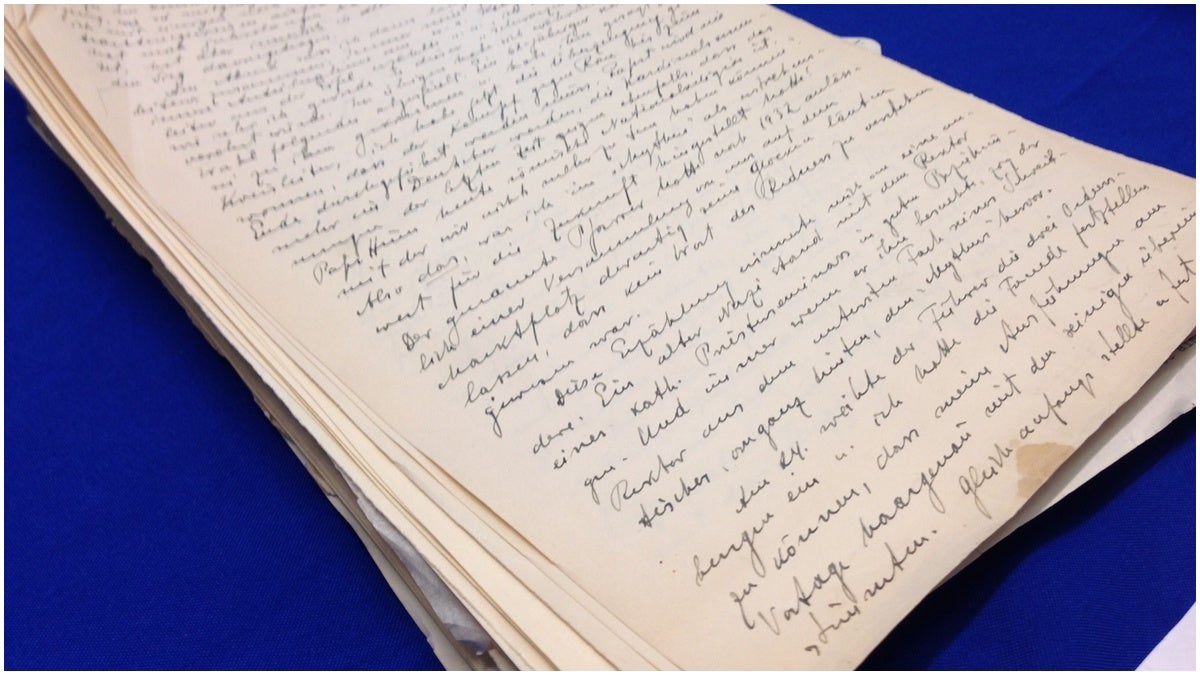Diary of Alfred Rosenberg, Hitler’s confidant, displayed in Delaware [video]

Seized diary pages of Alfred Rosenberg, one of the most influential members of the Nazi Party. (Nichelle Polston/WHYY)
One of the mysteries after World War II was what happened to the diary of Alfred Rosenberg, a close confidant of Adolf Hitler. The mystery has been solved and most of the answers were revealed in Wilmington.
“I can say working with the United States Holocaust Memorial Museum, and the United States Attorneys Office, agents from I.C.E’s Homeland Security Investigations office in Wilmington tracked the diary down and seized it for formal proceedings,” said Director John Morton of th U.S. Immigration and Customs Enforcement (ICE).
400 pages of writings from Alfred Rosenberg’s diary were smuggled into the United States by Dr. Robert Kempner, one of the U.S prosecutors at the Nuremberg trials. John Morton of Wilmington’s ICE Homeland Security office says all the pages have been recovered. “At first glance however we already see the Rosenberg diary is no ordinary diary of the time,” said Morton.
According to Morton, Rosenberg wrote the diary over a ten year period. A senior historian from the U.S Holocaust Museum first heard about the diary’s existence in 1996, and it was discovered in a home owned by Kempner in Lansdowne, Delaware County. But shortly after that, some of the collection went missing again. Morton says it’s taken nearly two decades to track down the whole thing.
“Why is the Rosenberg diary of such significance because as time marches on there are fewer and fewer living victims and witnesses to the horrors of the Third Reich….68 years have passed since the fall of Berlin and soon there will be no more human testimony of what happened during the holocaust and just as important of how it happened,” said Morton.
The diary gives a glimpse into how Rosenberg interacted with Hitler, as Henry Mayer of the National Holocaust Museum reads in this excerpt.
“He told Rosenberg ‘that Rosenberg your great hour has come’ and Rosenberg writes that what Hitler describes was so amazing that he couldn’t put it down to paper,” said Mayer who has searched for the diary for 17 years.
The last time the diary pages were seen was at the trial of Rosenberg in Nuremberg, Germany. Rosenberg who wrote in the diary from 1934-1944 was found guilty and hanged in 1946.
Rosenberg’s diary was recovered April 5th, 2013. It’s in the possession of U.S officials, but will later be turned over to the Holocaust Museum. The story of how the diary was finally reconstructed and shown off in Wilmington is as mysterious as the contents of the diary. Authorities knew Kempner had parts of the diary as early as 1996. At the unveiling in Wilmington they would only say other parts were found in New York state.
WHYY is your source for fact-based, in-depth journalism and information. As a nonprofit organization, we rely on financial support from readers like you. Please give today.




